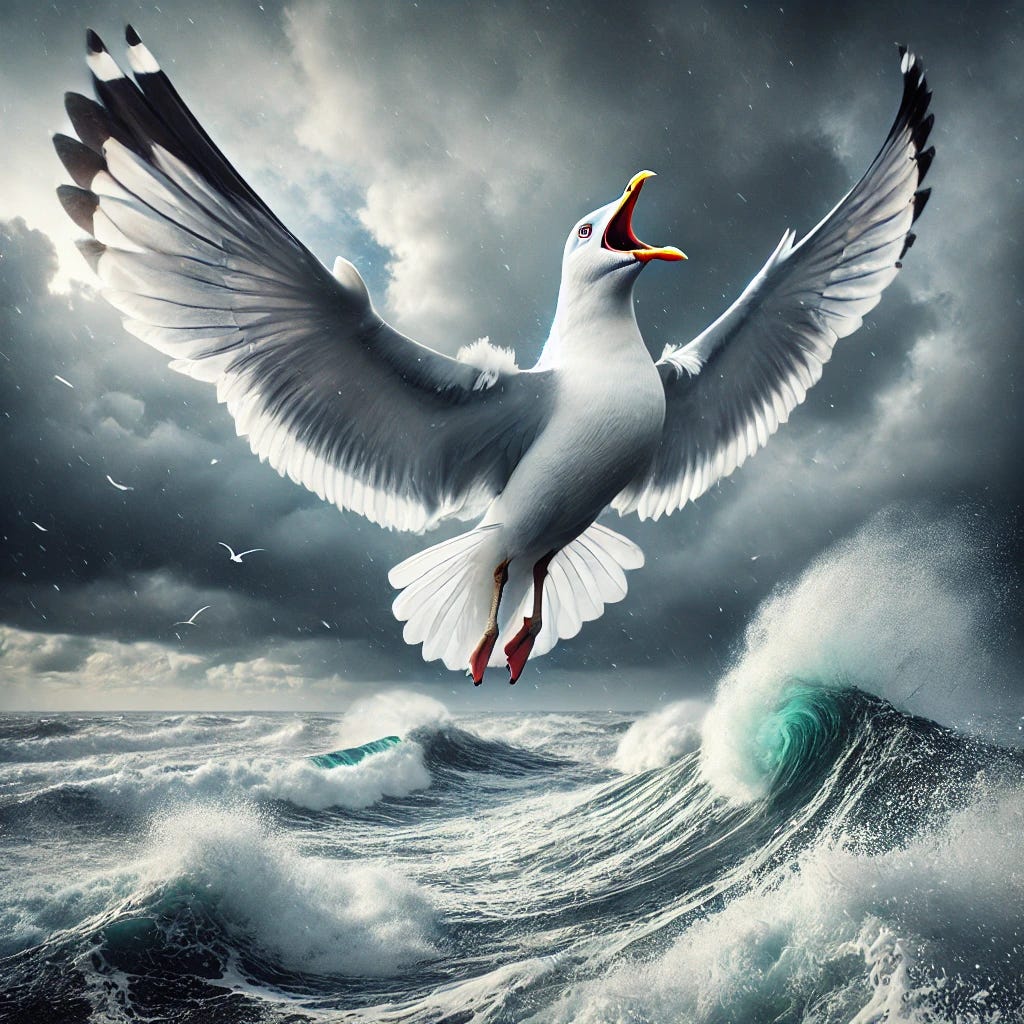The Bold Spirit of the White Seagull: A Poetic Celebration of Freedom and Resilience
A celebration of nature and freedom.
The Seagull by Mary Howitt "Oh, the white seagull, the wild seagull, A joyful bird is he, As he lies like a cradled thing at rest In the arms of a sunny sea! The little waves rock to and fro, And the white gull lies asleep, As the fisher's bark, with breeze and tide, Goes merrily over the deep. The ship, with her fair sails set, goes by, And her people stand to note How the seagull sits on the rocking waves, As if in an anchored boat. The sea is fresh, the sea is fair, And the sky calm overhead, And the seagull lies on the deep, deep sea, Like a king in his royal bed! Oh, the white seagull, the bold seagull, A joyful bird is he, Throned like a king, in calm repose On the breast of the heaving sea! The waves leap up, the wild wind blows, And the gulls together crowd, And wheel about, and madly scream To the deep sea roaring loud;— And let the sea roar ever so loud, And the winds pipe ever so high, With a wilder joy the bold seagull Sendeth forth a wilder cry. For the seagull, he is a daring bird, And he loves with the storm to sail; To ride in the strength of the billowy sea; And to breast the driving gale. The little boat, she is tossed about, Like a seaweed, to and fro; The tall ship reels like a drunken man, As the gusty tempests blow. But the seagull laughs at the pride of man, And sails in a wild delight On the torn-up breast of the night-black sea, Like a foam-cloud, calm and white. The waves may rage and the winds may roar, But he fears not wreck nor need; For he rides the sea, in its stormy strength, As a strong man rides his steed. Oh, the white seagull, the bold seagull, He makes on the shore his nest, And he tries what the inland fields may be; But he loveth the sea the best! And away from land, a thousand leagues He goes 'mid surging foam; What matter to him is land or shore, For the sea is his truest home. And away to the north 'mong ice-rocks stern, And among the frozen snow, To a sea that is loan and desolate, Will the wanton seagull go. For he careth not for the winter wild, Nor those desert-regions chill; In the midst of the cold, as on calm, blue seas, The seagull hath his will. And the dead whale lies on the northern shores, And the seal, and the seahorse grim, And the death of the great sea-creatures makes A full, merry feast for him. Oh, the wild seagull, the bold seagull, As he screams in his wheeling flight; As he sits on the waves in storm or calm, All cometh to him aright. All cometh to him as he liketh best, Nor any his will gainsay; And he rides on the waves like a bold, young king, That was crowned but yesterday!"
An ode to a white seagull, the poem glorifies the bird's freedom, toughness, and unbeatable spirit. Of course, such a seagull is cheerful and brave, with a feeling closely bound up in the sea—the mother who feeds but is full of dangers.
The first stanza presents the seagull as content and peaceful within the calm waves of the sea. The image is more delicate and quiet: the seagull rests on the water as though in peaceful sleep. The people in the boat pass by and observe the seagull, which has been anchored in its place without fluttering or moving an inch from what surrounds it. The peaceful waters and sky suggest a calm setting, in which the seagull equates to a king in his royal bed, thereby symbolizing the bird's right to the water as his natural kingdom.
The style, in the poem's progress, highlights the brave and adventurous spirit of the seagull. In the second stanza, the seagull is a daring bird that takes pleasure in storms. In sharp contrast to the frightened and desperate boat holding on for dear life to the surging sea, the seagull rejoices in this violence in the wild winds and roaring waves. The fearlessness of the bird is pitted against the vulnerability of man-made vessels, subject to similar forces easily negotiated by the seagull. But the laughter of the seagull man is proud and self-contained, and he loathes the land.
The third stanza elaborates on the seagull's relationship with the sea and how it prefers open water to land. The fact that the bird is more than willing to venture into these deserted, icy spaces of the north illustrates its adaptability and fearlessness. It finds support and satisfaction even among dead sea creatures in these harsh environments where the cold is aggressive. The ability of the seagulls to exist in such an extreme condition makes their image another mighty, unconquerable force of nature.
The concluding stanza repeats this determination and dominion over the realm decreed for the seagull. As the bird of unbounded confidence and command, whether storm-lashed or silvery-shining, in this poem, he is entitled to naturally rule the sea with his flight, cries, and presence upon the waves. It is the life of absolute freedom: everything in it is up to it, and nothing can go in its way. The seagull's life is a testament to the power of independence, a young king crowned points yesterday to a sense of newness and stamina in the reign of the seagull over the ocean.
The seagull's life expresses how powerful and majestic nature is, where life is led according to one's wishes without any bondages or fears. The seagull's majesty is a sight to behold, a grandeur that inspires awe and reverence.
It is a wonderful and romantic poem.






